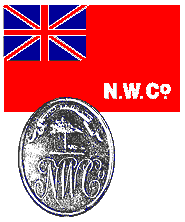|
Four
Traders
 Journals
and memoirs of four fur traders active in northern Wisconsin in this period
reveal how the fur trade was transforming this frontier and its inhabitants.
These writing record the activities of Jean Baptiste Perrault, 1783-1799;
George Nelson, 1802-3; Michael Curot, 1803-4; and François Malhiot,
1804-5. Journals
and memoirs of four fur traders active in northern Wisconsin in this period
reveal how the fur trade was transforming this frontier and its inhabitants.
These writing record the activities of Jean Baptiste Perrault, 1783-1799;
George Nelson, 1802-3; Michael Curot, 1803-4; and François Malhiot,
1804-5.
The
four witnessed, and sometimes carried out, the worst excesses of competition
between the large Montreal-based companies, as gifts and alcohol became
bribes that debauched both the recipient and giver. By the closing decades
of the eighteenth century it is clear that Indians are becoming heavily
dependent upon European trade goods, and tribes that once held aloof now
rushed to seek out traders. This competition was played out amid the continuing
Sioux-Chippewa warfare that erupted across northwestern Wisconsin and
westward into northern Minnesota.
Jean
Baptiste Perrault was born in Trois Rivières on the St. Lawrence
in 1761, entered the fur trade in 1783, and did not return from the west
for a visit to the lower lakes for twenty-two years. Perrault first went
as a trader to Cahokia, in Illinois, then on the Red Cedar near the site
of Menomonie in 1785, came to Prairie du Chien at the time of the 1786-87
treaty sessions, clerked for Pierre Grignon at Green Bay immediately thereafter,
ran a post on the Red Cedar in 1788-89, and traded at Lac Vieux Desert
in 1792, when he began working for the North West Company. In 1799 he
was on the Red Cedar again. "I could not settle down in any place,"
he later admitted.
Perrault's
operations in 1792 centered on what would become Wisconsin's northeastern
border with Michigan at Lac Vieux Desert, headwaters of the Wisconsin
River. Perrault selected six men at Mackinac and gave them "good
wages, for no one was obliged to enter here, because of the length of
the portage." They indeed earned their pay, for low water in the
Ontonagon River forced the crew to cache their canoes until spring and
portage all their goods - 40 packs - for thirty-three days. At one point
Perrault stopped to separately cache five kegs of rum, one of gun powder,
and two of lead and ball. Another trader was already operating out of
Lac Vieux Desert, and Perrault joined him to cover the area from l'Anse
at the foot of the Keweenaw Bay to Lac du Flambeau. Their first Indian
visitors, coming from the Wisconsin River headwaters, were given tobacco
and a two-gallon keg of rum to distribute to other Indians to encourage
their hunting activities. Perrault and his crew soon faced new difficulties:
they had to make fishing nets, and also had to hollow out a log to use
as a boat since they were unable to construct one of birchbark. Next spring
an Indian was hired to make three canoes of moose skins for them to use
in descending the river - demonstrating again the trader's dependence
on Indians.
Meat
from moose and other large game was plentiful at Lac Vieux Desert. Also,
Perrault had the men carve out 450 wooden bowls to use in making maple
sugar; seven kegs of sugar were eventually produced. But in the end the
meat, fish, and sugar at Lac Vieux Desert proved more abundant than furs:
despite a good beginning, Perrault received only 200 plus (a plus was
the basic measurement of pelts, defined as enough furs to equal one beaver
pelt. Perrault's trappers therefore caught furs of many animals, worth
200 beaver skins) of peltries, and half a pack of beaver. He told the
Indians he would not return - the district was simply unprofitable, the
portage too difficult.
During
Perrault's years in the fur trade Wisconsin he witnessed the extreme reliance
of Indians upon trade goods: as one of the Chippewas told Perrault at
the Red Cedar post, "whites are the support of the savages; we could
not live without them." But trapping conditions were changing, and
the Indians could not always bring in enough furs to erase their extensive
credit - at Lac Vieux Desert the Indians had been given 300 plus worth
of credits, but supplied only 200 plus in furs.
Although
Perrault labored for the North West Company for twelve years after 1793,
he did not grow to love his employer. In 1810, while with another company,
he had a run-in with North West and was threatened; he later explained,
"It is necessary to remark that at that time the North West was Legislator
and King,; it killed, hanged, stole, and violated, etc. The enormity of
their crimes let to their fall."
|


![]()
 Journals
and memoirs of four fur traders active in northern Wisconsin in this period
reveal how the fur trade was transforming this frontier and its inhabitants.
These writing record the activities of Jean Baptiste Perrault, 1783-1799;
George Nelson, 1802-3; Michael Curot, 1803-4; and François Malhiot,
1804-5.
Journals
and memoirs of four fur traders active in northern Wisconsin in this period
reveal how the fur trade was transforming this frontier and its inhabitants.
These writing record the activities of Jean Baptiste Perrault, 1783-1799;
George Nelson, 1802-3; Michael Curot, 1803-4; and François Malhiot,
1804-5.